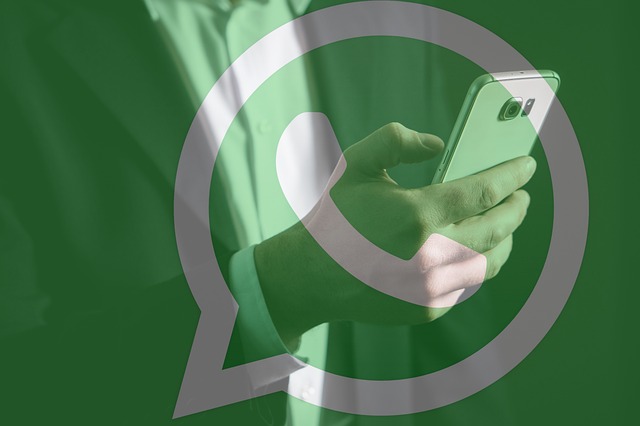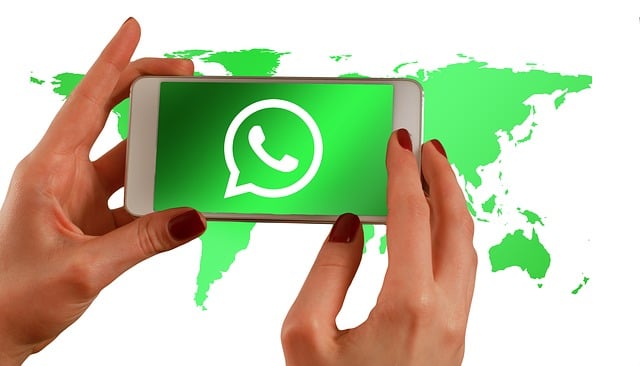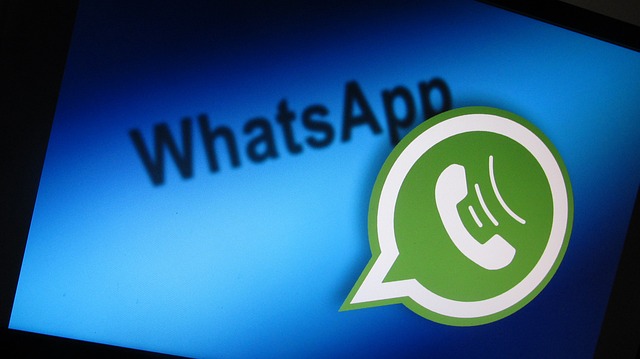WhatsApp: Unlocking the Power of Instant Messaging
Introduction
Welcome to an in-depth exploration of WhatsApp, one of the most widely adopted and influential messaging platforms in the digital age. With over 2 billion active users worldwide, WhatsApp has transcended mere communication, becoming a cultural phenomenon that shapes how people connect, share information, and conduct business. This article aims to provide a comprehensive guide, delving into every aspect of WhatsApp—from its humble beginnings to its global impact and future potential. By the end, readers will gain a profound understanding of this powerful tool and its role in our modern, digitally connected world.
Understanding WhatsApp: Unveiling the Basics
Definition: WhatsApp is a free, cross-platform messaging application that allows users to send text messages, voice notes, images, videos, and documents over an internet connection. It enables peer-to-peer communication as well as group chats, making it a versatile tool for personal and professional use.
Core Components:
- Instant Messaging: The cornerstone of WhatsApp, allowing real-time text conversations with individuals or groups.
- Voice and Video Calls: Facilitating voice and video communications, enabling users to connect face-to-face or over the phone.
- Media Sharing: Users can easily share various media types, including photos, videos, GIFs, and documents, enriching conversations.
- Group Chats: A feature that enables multiple participants to communicate, fostering collaboration and community engagement.
- End-to-End Encryption: WhatsApp employs signal encryption, ensuring secure messaging and protecting user privacy.
Historical Context: Founded in 2009 by Jan Koum and Brian Acton, WhatsApp initially gained popularity as a simple yet effective text messaging app. It quickly evolved to include voice and video calls, and by 2014, it was acquired by Facebook (now Meta) for $19 billion. This acquisition accelerated its global expansion and integration with other social media platforms.
Global Impact and Trends: A World Connected by WhatsApp
WhatsApp’s influence is profound and far-reaching, transcending geographical boundaries and cultural barriers. Its impact varies across regions, reflecting unique local preferences and needs.
Regional Adoption:
| Region | User Base (in millions) |
|---|---|
| Asia Pacific | 1.2 |
| North America | 750+ |
| Europe | 300+ |
| Middle East & Africa | 400+ |
- Asia Pacific: Dominant in countries like India, Indonesia, and Vietnam, WhatsApp is deeply ingrained in local communication patterns, often preferred over SMS.
- North America: Popular among younger demographics, it offers a seamless way to connect with friends and family, complementing traditional messaging apps.
- Europe: Widely adopted across various countries, WhatsApp serves as both a personal and business communication channel.
- Middle East & Africa: See significant usage due to its affordability and ease of use, bridging the digital divide in many regions.
Trending Patterns:
- Voice and Video Calling: The integration of voice and video calls has revolutionized long-distance communication, making WhatsApp a primary means of connecting with loved ones worldwide.
- Business Integration: Many small businesses use WhatsApp to provide customer support, handle orders, and market their products, demonstrating its versatility as a business tool.
- Digital Payment Solutions: In some regions, WhatsApp is transforming financial transactions through partnerships with payment gateways, making peer-to-peer money transfers convenient and secure.
- Community Engagement: Group chats foster online communities centered around shared interests, hobbies, or causes, creating virtual spaces for connection and collaboration.
Economic Considerations: The Business of Messaging
WhatsApp’s economic impact is multifaceted, shaping various sectors and contributing to global communication and trade dynamics.
Market Dynamics:
- Global Messaging Market: In 2022, the global messaging market was valued at $63.7 billion, with WhatsApp accounting for a significant share due to its vast user base and diverse feature set.
- Competitive Landscape: While it dominates the instant messaging space, competitors like Telegram, Signal, and iMessage (iOS) offer unique features, targeting specific niches and user preferences.
Investment and Monetization:
- Meta’s Investment: As a subsidiary of Meta Platforms, WhatsApp benefits from substantial investment in infrastructure, security, and feature development, ensuring its position as a leading messaging app.
- Monetization Strategies: Although primarily free to use, WhatsApp generates revenue through targeted advertising, business tools for small enterprises, and payment services (e.g., WhatsApp Pay).
- Partnerships: Strategic partnerships with e-commerce platforms, financial institutions, and delivery services enhance WhatsApp’s capabilities and open new monetization avenues.
Economic Impact on Small Businesses:
- Customer Engagement: Many small businesses leverage WhatsApp to build closer relationships with customers, leading to increased loyalty and repeat purchases.
- E-commerce Integration: Seamless integration with e-commerce platforms enables businesses to manage sales, provide product updates, and offer personalized shopping experiences via WhatsApp.
- Payment Processing: WhatsApp Pay facilitates secure peer-to-peer payments, empowering users in regions with limited access to formal banking systems.
Technological Advancements: Driving Innovation Forward
WhatsApp’s technological journey has been marked by significant innovations that have shaped the messaging landscape.
Key Developments:
| Year | Advancement | Impact |
|---|---|---|
| 2014 | Introduction of Voice and Video Calls | Revolutionized long-distance communication, increasing user engagement and satisfaction. |
| 2016 | End-to-End Encryption | Enhanced user privacy, ensuring secure messaging and earning trust among users concerned about data security. |
| 2017 | WhatsApp Business API | Enabled e-commerce integration, allowing businesses to interact with customers more effectively. |
| 2020 | WhatsApp Pay (Select Regions) | Introduced peer-to-peer payment functionality, expanding financial services accessibility. |
| 2021 | AI-Powered Features | Implemented AI for personalized stickers, improved media sharing, and enhanced group chat experiences. |
Future Technologies:
- Artificial Intelligence (AI): Advanced AI capabilities can personalize content, improve language translation in chats, and enable more intuitive user interactions.
- Blockchain Integration: Exploring blockchain technology could enhance data security, facilitate decentralized payments, and create a more transparent user experience.
- Internet of Things (IoT): WhatsApp’s integration with IoT devices may enable new communication methods, such as connecting smart home appliances to send messages or make calls.
- Augmented Reality (AR) Features: AR filters and effects can enhance group chat experiences, offering creative ways to express oneself during conversations.
Policy and Regulation: Navigating Legal Waters
As a global messaging platform, WhatsApp operates within a complex web of policies and regulations that vary across jurisdictions.
Data Privacy Laws:
- GDPR (General Data Protection Regulation): WhatsApp must comply with GDPR in the EU, ensuring user data privacy and security. This includes obtaining explicit consent for data processing and providing transparent privacy policies.
- CCPA (California Consumer Privacy Act): In California, businesses like WhatsApp are subject to CCPA, granting consumers control over their personal information.
Content Moderation and Safety:
- Spam and Fraud Prevention: WhatsApp employs advanced spam detection systems to protect users from unwanted messages and fraudulent activities.
- Safety Features: They offer tools for reporting harmful content, blocking users, and providing resources for online safety education.
Collaboration with Law Enforcement:
- WhatsApp cooperates with law enforcement agencies in investigations, but it balances this with user privacy concerns, often leading to legal debates over data access.
International Regulations:
- Country-Specific Rules: WhatsApp must adapt its policies and practices to comply with local laws, such as India’s IT Act and the United Arab Emirates’ Cyber Crime Law.
- Net Neutrality: In some regions, regulations promote net neutrality, ensuring that WhatsApp does not prioritize or block specific content or services.
Challenges and Criticisms: Overcoming Barriers
Despite its widespread success, WhatsApp faces several challenges and criticisms that require strategic solutions to maintain its competitive edge.
Main Concerns:
| Challenge | Description | Solutions |
|---|---|---|
| Data Security Concerns | Critics argue that end-to-end encryption might hinder law enforcement access to messages in criminal investigations. | Balancing privacy and security through secure data storage, advanced encryption protocols, and targeted data access for valid legal requests. |
| Spam and Fraud | Unregulated spammers can exploit WhatsApp’s popularity, leading to unwanted messages and fraud. | Implementing robust spam detection algorithms, user feedback systems, and collaboration with security agencies to combat fraudulent activities. |
| Competition from Native Messaging Apps | In certain regions, native messaging apps offer similar features, posing competition for global dominance. | Continuous innovation, localized feature adaptations, and strategic partnerships to maintain a competitive edge in diverse markets. |
| Reliance on Internet Connectivity | Areas with limited or unstable internet access may hinder WhatsApp’s effectiveness. | Exploring offline messaging capabilities, optimizing data usage, and investing in partnerships to bridge the digital divide. |
Case Studies: Real-World Applications of WhatsApp
WhatsApp’s versatility is exemplified by its successful implementation across various sectors and contexts. These case studies reveal the power of this platform and the positive impact it can have when tailored to specific needs.
1. Healthcare Communication:
A hospital network in Brazil utilizes WhatsApp for secure patient communication, allowing doctors to provide remote consultations and share medical records. This has improved access to healthcare, especially in rural areas.
2. E-commerce Business:
An online clothing store in Southeast Asia uses WhatsApp as its primary customer support channel. Customers can message the bot for product recommendations, returns, and complaints, leading to increased sales and positive reviews.
3. Community Engagement:
A non-profit organization running a shelter for homeless youth in the US employs WhatsApp groups to connect volunteers, staff, and residents. This facilitates efficient coordination, resource sharing, and emotional support within the community.
Future Prospects: A Glimpse into Tomorrow’s Messaging
As we peer into the future, several trends and developments point towards an even more integral role for WhatsApp in our lives.
Potential Growth Areas:
- Global Expansion: With improved infrastructure and localized features, WhatsApp can further penetrate underserved markets, connecting more people worldwide.
- Enterprise Solutions: Advanced business tools and APIs will empower larger enterprises to leverage WhatsApp for customer service, marketing, and internal communications.
- Integrations with Other Platforms: Open API access could enable seamless integration with social media, e-commerce, and productivity apps, creating a more unified digital experience.
Emerging Trends:
- Voice-Activated Messaging: AI-powered voice assistants may revolutionize WhatsApp interactions, allowing hands-free messaging and easier accessibility for all users.
- Digital Identity Verification: Implementing secure identity verification could enhance user trust and enable new business models on the platform.
- Interactive Media: Expect more interactive content, such as polls, quizzes, and augmented reality filters, to enrich group chat experiences.
Strategic Considerations:
- Privacy Enhancements: Continuously evolving privacy features while adhering to global regulations will be crucial to maintaining user trust.
- Personalization: Customizing the platform’s interface and content based on user preferences can drive engagement and loyalty.
- Global Partnerships: Collaborating with local businesses, governments, and NGOs can help WhatsApp navigate cultural nuances and address regional challenges.
Conclusion: A Digital Messenger Transforming Connections
WhatsApp has transcended its initial role as a simple messaging app to become a versatile tool that shapes how we communicate, connect, and conduct business in the digital age. Its global impact, technological innovations, and successful real-world applications underscore its importance.
As WhatsApp continues to evolve, it must address challenges related to data security, spam, competition, and connectivity disparities. However, with strategic investments in technology, partnerships, and localized adaptations, WhatsApp can maintain its leading position. The future of messaging looks bright for this platform, promising to connect even more people across borders and cultures.
FAQ: Answering Common Queries
Q: Is WhatsApp secure for sharing sensitive information?
A: Yes, WhatsApp employs end-to-end encryption, ensuring that only the sender and receiver can access the content of messages. This makes it a secure platform for sharing sensitive information.
Q: How does WhatsApp make money?
A: WhatsApp generates revenue through targeted advertising, business tools for small enterprises (WhatsApp Business), and payment services like WhatsApp Pay. It also benefits from Meta’s substantial investments in infrastructure and development.
Q: Can I use WhatsApp without an internet connection?
A: While WhatsApp primarily requires an internet connection for optimal functionality, it offers offline messaging capabilities for some features, such as sending messages or viewing media previously downloaded to your device.
Q: How does WhatsApp handle user data privacy?
A: WhatsApp complies with global data privacy laws, including GDPR and CCPA, by obtaining user consent, providing transparent privacy policies, and implementing robust security measures to protect user data.
Q: Is it possible to send anonymous messages on WhatsApp?
A: While there’s no built-in feature for completely anonymous messaging, users can maintain a level of privacy by setting up secure backups, using third-party apps for encrypted chats, or enabling the “Show My Name” option instead of their full name.









